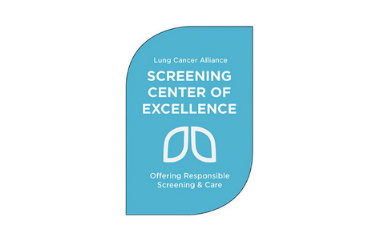In the United States, more people—men and women—die from lung cancer each year than any other type of cancer. Common symptoms may include chest pain, wheezing and shortness of breath, persistent exhaustion, unexplainable weight loss, and constant coughing, which is partly why this type of cancer is often diagnosed in advanced stages: These symptoms may be mistaken for other illnesses, or written off as seasonal viruses. 
That’s what makes regular screenings so, so important. For lung cancer specifically, the ultimate goal of screening is to find the disease early in people who are at highest risk. According to the National Comprehensive Cancer Network (NCCN), those individuals fit into two distinct groups:
- Group 1: People aged 55 to 77 who currently smoke, or have 30 or more pack years of smoking and have quit within the last 14 years.
- Group 2: People aged 50 or older with 20 or more pack years of smoking and other relevant risk factors (excluding exposure to secondhand smoke). Check with your insurance provider to make sure the screening is covered.
Those other risk factors may include a history of cancer, a family history of lung cancer, history of COPD or pulmonary fibrosis, or contact with radon, asbestos, or other cancer-causing agents.
The NCCN recommends that individuals in both Group 1 and Group 2 participate in annual lung cancer screenings. At Saratoga Hospital Medical Group—Pulmonology & Sleep Medicine, the Lung Cancer Screening Program offers patients a low-dose computed tomography (LDCT) scan, which incorporates X-ray technology to provide a detailed image of a patient’s lung.
In that image, the radiologist is looking specifically for suspicious nodules, but it is important to remember that more than 95% of nodules are not cancerous; in the event you have a finding, your doctor will likely recommend a follow-up scan in approximately six months to make sure the nodule has not grown. At that time, if it is necessary, you may undergo further testing.
Ultimately, you and your provider have the same goal: prevent lung cancer, or catch it in the earliest stage when it is most treatable. Of course, the best way to do that is not to rely on a single scan only once per year. As part of your annual physical, talk to your provider about any concerning symptoms or unexplainable changes. Update your health history if you learn new information, and consider making a concentrated effort to quit smoking.
For more information on the Lung Cancer Screening Program, or resources to quit smoking, please call Cathy Vosburgh, RN Navigator, at 518-580-2299. If you are in need of a primary care provider, please call the Saratoga Hospital Medical Group Patient Concierge at 518-886-5900
Monday – Wednesday:
8:00 AM – 5:00 PM
Thursday: 8 AM – 3:30 PM
Friday: 8 AM – 5 PM
Extended hours, by appointment:
Monday – Friday:
7:30 AM – 8:00 AM
518-886-5112
Fax: 518-886-5880

